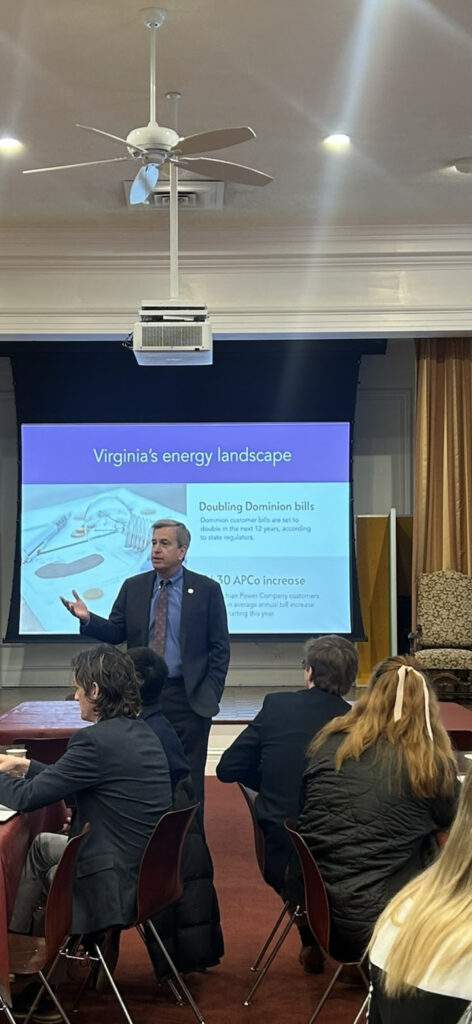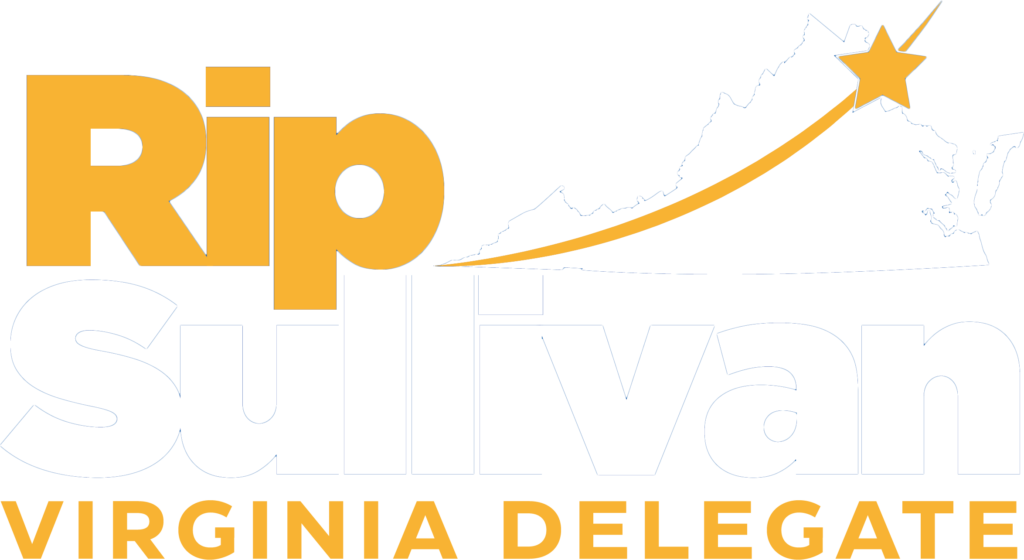The week before crossover is always a bit frantic. And this one surely was.
This was the last week bills could be heard in committees to make it to the floor. I spent many hours this week negotiating with and cajoling stakeholders and advocates, as we careen toward crossover.
High School Advocates
I like all of my bills, but HB121 is my favorite this year. The idea was brought to me by several bright and determined students at Mclean High School. They were concerned that their existing curriculum did not teach kids enough about allergic reactions—and we all know allergies are an enormous challenge for many kids and their families. They thought kids should know more about how to recognize an anaphylactic reaction, and what to do if a friend is having a reaction and is in danger. They set about to create a short—and very effective—video, which included lots of information and an interactive quiz.
Working with Principal Ellen Reilly a pilot program was started in which the video was viewed by every student at MHS. And Fairfax County Public Schools is considering it system-wide. The kids then came to me, and we decided to take it statewide. HB121 requires the state Board of Education to include an in-person or online severe allergic reaction awareness training in the Standards of Learning for health education for grades nine and ten, and to consider using the MHS pilot. The bill passed the House unanimously today and is headed for the Senate. Bravo to these community-minded high school advocates!

Plenty of Progress
I am pleased to report that 14 of my bills have passed the House, with hopefully more to come.
Over the last several sessions I have carried numerous bills that have made the way we compensate Virginians who have been wrongfully incarcerated more fair. Not often—but too often—people are incarcerated for crimes and are later found to be innocent. In some cases, wrongfully incarcerated for over 30 years. I have worked to improve our compensation laws.
This session I carried HB640 and HB641. HB640 updates our wrongful incarceration statutes by eliminating the requirement that an awardee receive most of their compensation over time, through an annuity. These wronged individuals are entitled to their compensation immediately. HB640 also provides compensation to those who were wrongfully on the sexual offender registry or death row.
HB641 is a bill that compensates Mr. David Kingrea—an innocent man—for his eight years wrongfully spent on the SOR. His testimony about the effect on his life and employment prospects—and the effect on his son—of his neighbors and potential employers knowing he was on the SOR was very moving. HB640 and HB641 both passed the House unanimously.
On Tuesday, the Labor and Commerce subcommittee 3 convened. Sub 3 is where all the energy-related bills are heard, and happens to also be the subcommittee I chair. Out of the 13 bills heard in the subcommittee, 8 of them were mine.
HB106 expands Virginia’s shared solar program in Dominion’s service territory. The pilot program we established several years ago has been very successful, so HB106 expands the program by raising the amount of shared solar generation allowed. HB106 will make the shared solar program more broadly available, and hopefully lower the minimum bill to incentivize more use of the program. I oversaw intense negotiations between the solar industry and Dominion. I am pleased it passed the Labor and Commerce subcommittee Tuesday and passed the full Labor and Commerce committee on Thursday.
HB108 is almost exactly the same as HB106, but establishes a new shared solar program in Appalachian Power’s service territory.

Speed Things Up
I have been focused on accelerating our clean energy transition. One issue that often slows things down is permitting delays and related litigation. I am a litigator in my real world job, and understand that people who want to have a court hear their grievances with a permitting decision have every right to do so. But we ought to ensure the process moves as quickly as possible. HB122 will accelerate the process of appealing a permitting decision made by the Department of Environmental Quality, by having all cases heard in the Circuit Court in Richmond. The Richmond Circuit Court is the usual venue for cases involving state agencies, has more experience with the issues, and its staff is familiar with handling those sorts of regulatory cases. I am pleased to report that HB122 passed the Labor and Commerce subcommittee 3 and full Labor and Commerce committee.
HB638—the Affordable, Reliable, Competitive Act, (ARC)—which I described last week, aims to inject more competition into Virginia’s clean energy sector. I worked hard to bring the various interested parties to a consensus on this bill, but while the bill passed the subcommittee it was clear it did not have the votes in the full committee. I decided to carry the bill over to next session and will continue to work in the interim to resolve the issues with the bill.
HB117 is a bill that modifies our rules regarding solar projects’ interconnection with the grid. When a solar project is completed it has to be connected to the grid in order to provide the energy generated. HB117 clarifies how that process is handled with the State Corporation Commission, and tries to speed up the process to get more projects started. I am disappointed to report that HB117 failed in the Labor and Commerce subcommittee. I’ll try again next session.
HB118 would have established rules for building public electric charging stations by non-utilities and utilities alike. I am disappointed that HB118 failed in the Labor and Commerce subcommittee 3.
HB636 was one of the most controversial bills I’ve had in my time in the House. The bill deals with siting approval of solar and wind projects, and started a conversation about the intersection of local land use authority with statewide priorities. Many localities are closing themselves off to renewable energy projects entirely, or creating barriers to renewable energy. HB636 explored the possibility of establishing a process and criteria for an applicant to go to the State Corporation Commission for consideration and approval of a project. This is a puzzle we must solve and a challenge we must meet if we are to continue to accelerate our energy transition. HB636 was carried over to next session, and I hope in the interim to make progress on exploring our options.
Another bill that generated a lot of attention was my HB116. It would have established energy efficiency rules for new data centers. Data centers qualify for certain tax exemptions in Virginia, and the bill would have required that future data centers use more renewable energy, operate as efficiently as possible, and wean themselves off the use of diesel fuel generators for backup power.
The requirements it set were very achievable, and for an industry surrounded by such controversy I had hoped it would embrace the bill to demonstrate its commitment to be good corporate citizens. After all, if data centers are going to consume such a large amount of power from our grid, the least they can do is use as little energy as possible. But no such luck. The industry resisted the idea and HB116 was carried over to 2025. I will be back.

I was pleased to speak at the Day of Action for Affordable Energy on Tuesday morning and discuss my energy priorities. I highlighted a few of my bills and focused on the importance of accelerating our use of clean energy in Virginia.

I was also happy to meet with constituents who are members of the Jewish Community Relations Council of Greater Washington, and with representatives of the Port of Virginia.
Crossover is Tuesday, and I’ll change my focus to getting the Senate to pass my bills.
Come down and say hello if you can, and if my office or I can be of any help to you, please be in touch at 804-698-1006 or send an email to delrsullivan@house.virginia.gov.
Best,

Rip Sullivan
Delegate, 6th District
C: 571-210-5876

